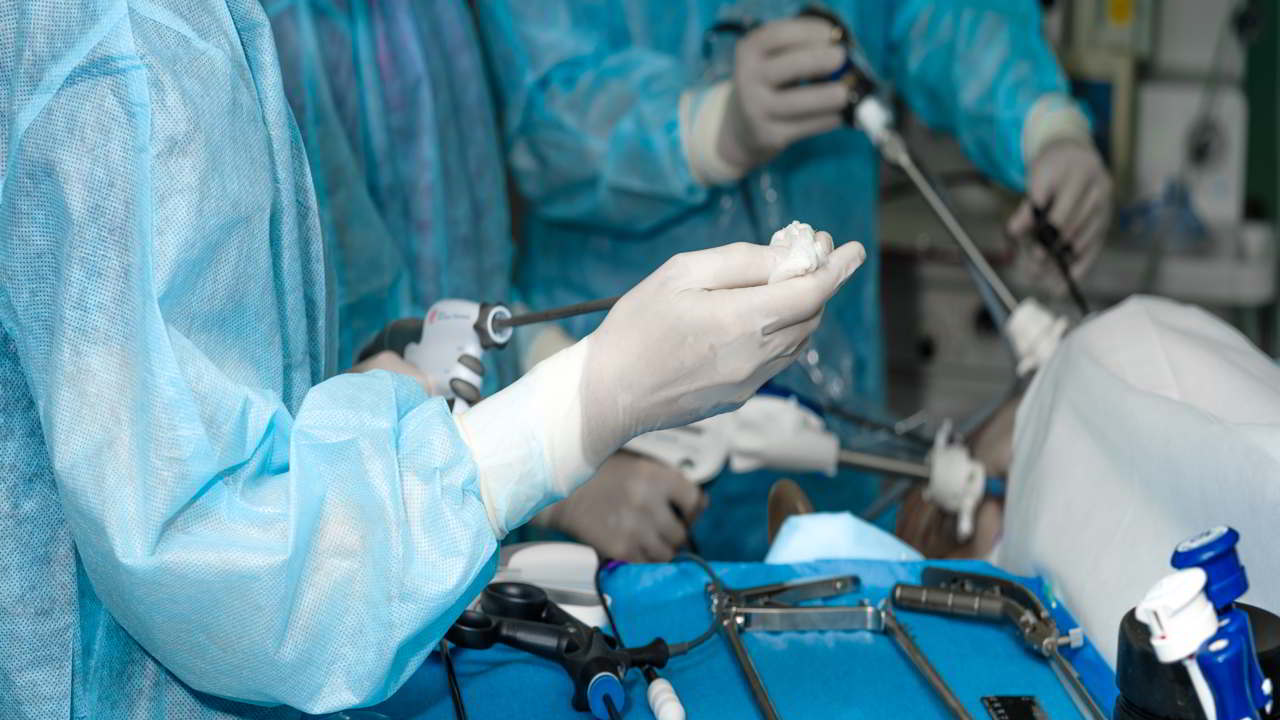As a pediatrician at ONP Hospitals, I’ve witnessed countless stories of resilience and recovery, but one case stands out—little Anaya’s story. Anaya, a spirited four-year-old, came to us after a severe finger injury that happened while she was playing in the backyard....

Overview
To have a better look at your reproductive organs and the organs in your abdomen, you may need to have a laparoscopy performed. This treatment may assist in the diagnosis of a variety of medical disorders and the collection of biopsies – samples of tissue that are analyzed. In addition, a laparoscopy is a technique that is typically safe and has minimal problems.
Every year, about 15 million laparoscopic operations are done worldwide, with the United States accounting for nearly a third of the total, or around 4,800,000 procedures.
Everything You Need To Know About Laparoscopy
What is It?
A laparoscopy is a technique that is performed to examine the organs in the abdomen (abdomen). It may also be used to examine a woman’s pelvic organs.
Laparoscopy is performed using a narrow, illuminated tube that is equipped with a video camera. A laparoscope is a name given to the tube. It is inserted into a small cut or incision in your stomach. The pictures captured by the video camera may be viewed on a computer screen.
One of the advantages of laparoscopy is that it is a less intrusive procedure. That is to say; it makes a very little incision in the stomach. As a result, laparoscopic surgery is often less time-consuming and results in a quicker recovery period than open surgery.
A laparoscopy procedure may be performed to obtain a tiny tissue sample for laboratory testing (a biopsy). Moreover, it may be utilized to remove organs such as the appendix (appendectomy) or the gallbladder (cholecystectomy).
Common Conditions treated by it
To detect and diagnose the cause of pelvic or abdominal discomfort, laparoscopy is often performed. In addition, it is often used when noninvasive approaches are ineffective in diagnosing a condition.
It is also possible to identify abdominal disorders using imaging methods such as those described below:
- Ultrasound, which is a medical procedure that creates pictures of the body by using high-frequency sound waves.
- In contrast to conventional radiography, CT scanning uses specific X-rays to create cross-sectional pictures of the body.
- An MRI scan is a kind of imaging procedure that produces pictures of the body by using magnets and radio waves.
- When these tests fail to offer enough information or insight to diagnose, laparoscopy is done to help make the diagnosis.
- Additionally, the surgery may be performed to get a biopsy, a sample of tissue, from a specific organ in the abdomen.
Your doctor may propose laparoscopic surgery to evaluate the organs listed below:
- Appendix
- Liver
- Gallbladder
- Spleen
- Pancreas
- Small intestine and large intestine (colon)
- Pelvic or reproductive organs
- Stomach
Your doctor may discover the following conditions by using a laparoscope to examine these areas:
- A lump or tumor in the abdomen
- The presence of fluid in the abdominal cavity
- Liver disease
- The effectiveness of certain treatments
- The extent to which a specific malignancy has progressed
In addition, your doctor may be able to execute an intervention to address your illness as soon as possible when it is discovered.
Procedure
During a laparoscopic procedure, it is performed when you are lying down in a moderately slanted posture, with the head lower than the feet. During surgery, you will be provided anesthesia to calm your muscles and keep you from feeling pain.
Following that, a tiny incision is made close to the navel. Through this incision, the laparoscope is placed into the patient. Your abdomen has been expanded to make your organs more visible. The laparoscope may be outfitted with surgical equipment for obtaining tissue samples or eliminating scar tissue during the procedure.
It is also possible that laparoscopic physicians may make a second incision near the pubic hairline. This incision offers an extra entry for the required tools for minor surgical operations to be completed.
After surgery, you’ll typically be in the recovery room for approximately an hour after the procedure. Then, a little time later, you’ll be transferred to an outpatient surgery facility for further observation.
After completing your home rehabilitation instructions, you will be released. In most circumstances, you will be able to leave the hospital within four hours after having a laparoscopy. It is quite unusual for a patient to be required to remain in the hospital overnight after this treatment.
Following your laparoscopy, you will be required to return to your healthcare provider’s office for follow-up sessions within two to eight weeks following the procedure. Please check your follow-up appointment schedule with your healthcare practitioner before leaving the hospital.
Before having surgery, one thing to keep in mind is that you will not be allowed to drive for at least 24 hours following the procedure. So prepare for the possibility of having someone come pick you up and remain with you for the first 24 hours after your arrival.
Conclusion
With laparoscopy, doctors may identify and treat a wide range of gynecologic problems on an outpatient basis. Compared to abdominal surgery performed via bigger incisions, the recovery period for patients is very short and much shorter. Patients should speak with their doctors about their concerns regarding laparoscopic procedures and the dangers associated with them before having the surgery.
Sub Services
What Patient has to say about us
People heavily rely on reviews from other patients when choosing a healthcare provider
Our Patients Many many happy returns of the day......... The best doctor in the world My mother was suffering from severe pain in both knees and spine. Dr. Aashish arbat sir has operated today after 15days she is doing every thing thank you Dr aashish arbat sir and team Especially the major support was from Dr Ram sir from admission to dischatge and follow ups and taken care very nicely thanku Dr. Ram sir Our Patients After enduring knee pain for the past decade, my mother sought advice from various doctors in Nagpur, Nashik, and Pune. They all recommended knee replacement surgery, but it was only when we discovered Dr. Aashish Arbat and the option of robotics surgery that we made the decision to proceed. The surgery took place on June 23, 2023, and it turned out to be an incredible experience. To our astonishment, on the morning of June 24, my mother was able to stand on her own legs and even take a few steps. This remarkable progress was made possible due to the advanced assistance of robotics arm and Artificial Intelligence. Dr. Aashish Arbat is an exceptional and highly experienced surgeon, and we are immensely grateful for his expertise. We also extend our appreciation to his colleagues, Dr. Sharma and Dr. Ram, for their excellent skills and compassionate nature. Our heartfelt thanks go out to the entire team for enabling my mother to live a pain-free life Our Patients My mother got her both robotic knee replacement from sir on Oct 2021. The team and sir have made the complete process seamless. Especially my mother was very comfortable post her surgery. Thank you Dr Arbat and team. Our Patients Our Patients Our Patients Hello. My wife has severe arthritis in her body knees since 2017. We communicated many doctors but she was not happy. We visited Dr arbat for same issue and he came up with robotic knee replacement solution which suited her accurately and she is walking 5-6km daily without hesitation and living comfortably. Thanks Dr. Aashish Arbat and his new technology.![]()
Chhaya Kate
![]()
pravin kharat
![]()
T Srivalli
![]()
Mohan Satavekar
![]()
VIVEK PANDEY
![]()
Subhash Bobade
Meet Our Team of Experts
22+ Years of Experience
Dr Neeraj Rayate
MBBS, DNB-General Surgery
Consultant Laparoscopic Surgeon | Bariatric Surgeon | Laparoscopic Surgeon | General Surgeon
20+ Years Experience
Dr. Ashish Shrivastava
General,Laproscopic & Proctologist
MBBS DNB-General Surgery,FACRSI,IAGES
20+ Years Experience
Dr Satish Pattanshetti
MBBS, MS-General Surgery
Consultant Laparoscopic Surgeon | Bariatric Surgeon | Metabolic Surgery | Laparoscopic Surgeon | General Surgeon
16+ Years Experience
Dr. Suhas Patil
Proctologist | Laparoscopic Surgeon | General Surgeon | Piles, Fistula & Fissure LASER Treatment
Blogs
Addressing Childhood Obesity: Preventative Measures and Healthy Lifestyle Choices
Childhood obesity is growing concern. More kids are affected every year. Tackling this issue early is crucial. This ensures children grow up healthy and happy. Fortunately, there...
Healthy Sleep Habits for Children: Tips for Parents
Good sleep is essential for children’s health and development. Yet getting kids to sleep can sometimes feel like an uphill battle. Establishing healthy sleep habits early on sets...
The Role of Diet and Nutrition in Managing Encopresis in Children: Insights from Dr. Amita Phadnis
Encopresis, a condition characterized by involuntary soiling in children, can be distressing for both the child and their family. First and foremost, complete treatment of...
Videos
Dr. Amita Phadnis’s Full Speech on Survival & Health Rights at UNICEF India.
Dr. Amita Phadnis ,M.D., Gave a Motivating Speech
Breast cancer is cancer that forms in breast cells. Women are mostly diagnosed with this cancer. Although it can be seen in both men and women
What is AMH
The granulosa cells in your ovarian follicles create the anti-Mullerian hormone, often known as AMH. According to the American College of Obstetricians and Gynecologists (ACOG), the generation of AMH is a reflection of your ovarian reserve.
FAQ’s
Pregnancy and Migraine Headaches: What Women Need to Know
When you are pregnant or breastfeeding, then you should be aware that migraine headaches are a normal part of the journey. Pregnant women might feel headaches owing to...
What Is the Problem of Orthopedics in Children?
While orthopaedic problems are commonly seen in and associated with the elderly, it’s important to be alert regarding the fact that they can afflict young people and children as well.
All You Need to Know About Reproduction
Most science students have to study about reproduction in their high school syllabus, and some learn from their parents, who may discuss it even earlier. It’s a very good thing to know about our own bodies…
Explore All Departments

ONP Prime

ONP Leela

IVF

Oncology

Pediatrics

Urology

Neonatology

Ophthalmology

Orthopedics

Gynaecology

Cardiology

IVF

Oncology

Pediatrics

Urology

Neonatology

Ophthalmology





 Home
Home






